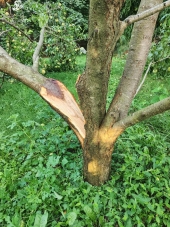posted 5 years ago
I've read in more than one place that properly coppiced trees can live 3-4 times longer than its "natural" relative. Because the tree isn't having to "build a root system" each time the wood is harvested, so one might be surprised just how efficient this system is from the ecological perspective. Personally, I don't believe that much of the North American forestry system is sustainable - too much destruction during harvesting, too much monoculture, too much use of pesticides/herbicides in an effort to get just what the logger wants. North American logging does *not* include "natural regeneration" of the forest that builds soil.
British-style coppicing, and this cool-looking Japanese style both require a lot of "human power" which is seen as "less efficient" but in fact is more sustainable and can give a quality product. Both can easily be done on relatively small tracts of land surrounded by other land uses. However, many of the people I speak to about this concept, can't seem to accept the value of it. I guess the can't see the tree for the forest!








